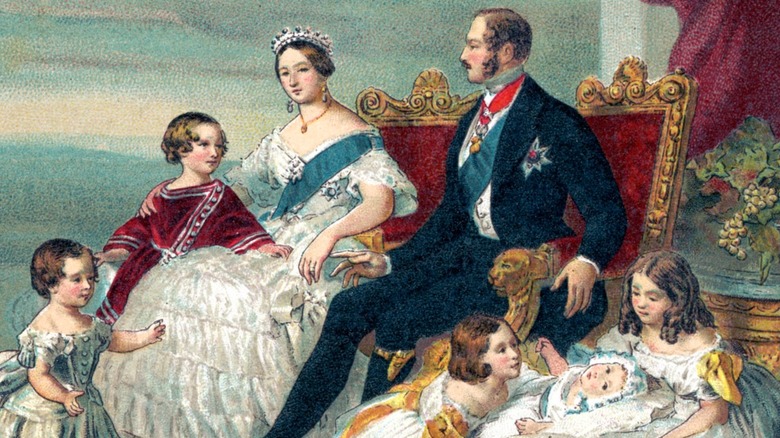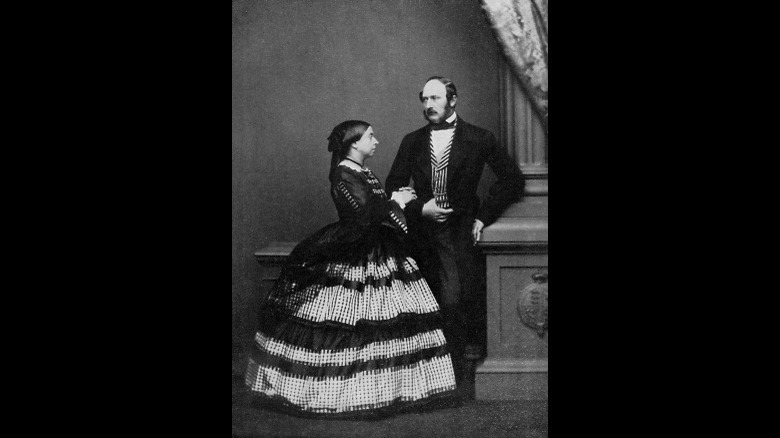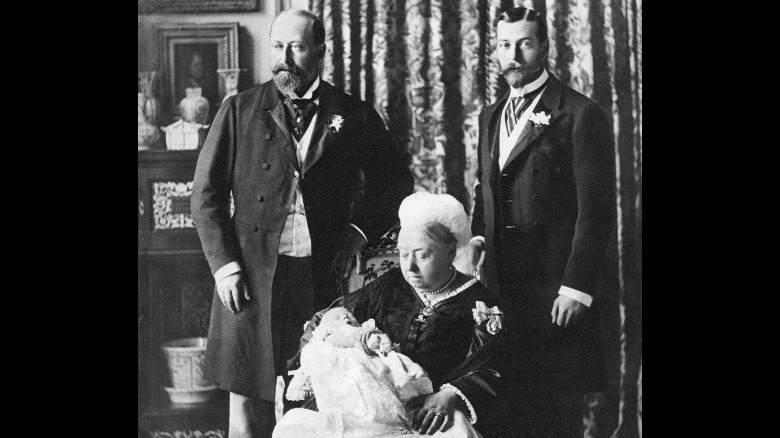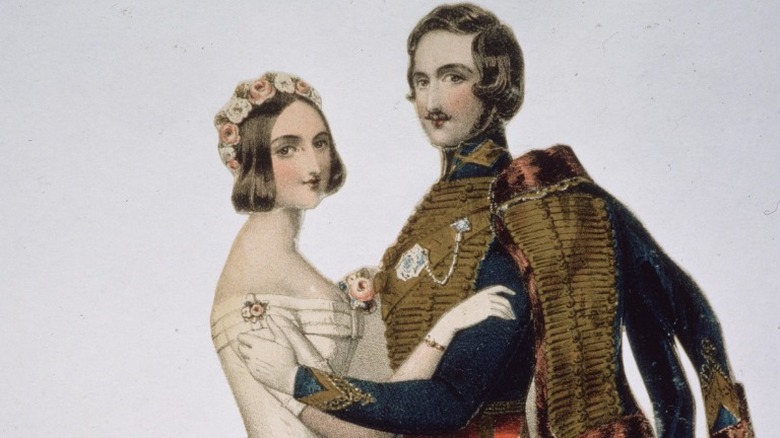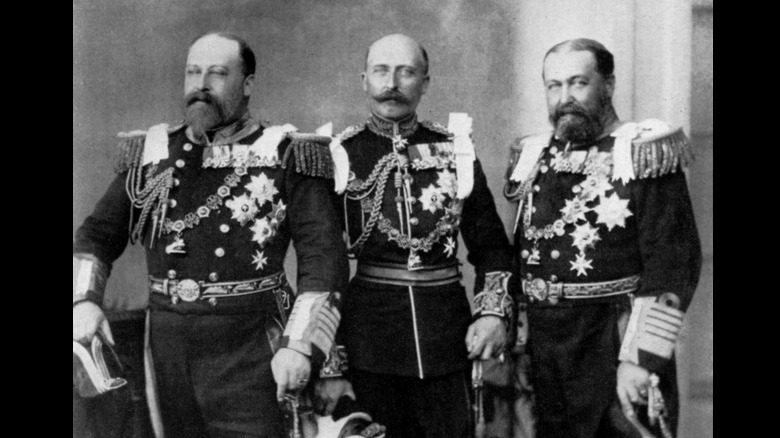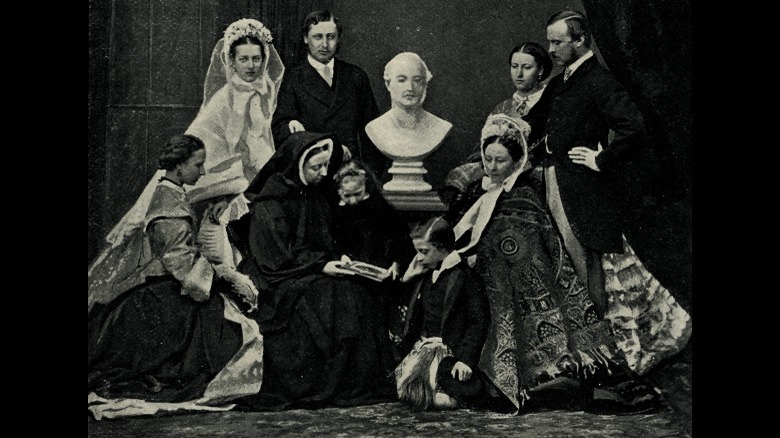What Queen Victoria Really Thought About Motherhood
Queen Victoria once wrote that children often turn out to be a "bitter disappointment" to their parents (via History Extra). That was likely true for her, considering her headstrong daughters and scandalous eldest son. Her recorded views on motherhood were rarely positive. However, according to Town & Country, the picture they paint may not be accurate, given the extensive censoring of her writing before it was made public.
The famous monarch had nine children — five daughters and four sons. Unusually for the time, they all lived to adulthood. She considered it a mother's duty to be severe with her children (via BBC). Her husband, Prince Albert, actually warned her that if she continued that way, she wouldn't have good relationships with them. Her main complaint about children was that they were too noisy. Her own childhood, spent mostly with adults as she had no full siblings, may have contributed to her mixed feelings about children, according to Royal Central. Still, she wrote more positively of them to some of her female friends, expressing her love for them, her concerns about raising them, and her fear of childbirth. This was among the information originally edited out of her writing (via Town & Country).
Her thoughts on pregnancy
Queen Victoria had nine children over 17 years (via BBC). During her pregnancies, she wasn't able to do as much of the direct work of ruling and had to delegate these duties to Prince Albert. She resented having to share her power, and this led to fights between the couple. Victoria's strong temper sometimes caused Albert to worry that she was as mad as her grandfather, King George III. She almost certainly experienced pre- or postpartum depression — she wrote to one of her daughters about the "lowness and a tendency to cry" she associated with pregnancy. After her second child's birth, she even experienced hallucinations, according to Town & Country.
Per the publication, these negative experiences probably led to her descriptions of pregnancy as "an unhappy condition" and "the shadow side" of life. She also said being pregnant made her feel like an animal: she likened herself to a dog, cow, rabbit, and guinea pig. Even years later, she reacted to her eldest daughter's pregnancy by saying it was "horrid news" (via BBC).
Her thoughts on breastfeeding
The queen had a similar reaction to finding out her daughters were breastfeeding their babies. She called them cows, too, and went so far as to name an actual cow at Balmoral Castle after her second daughter, Princess Alice (via Royal Central). Although she had been breastfed by her own mother, Queen Victoria was strongly opposed to the practice. She considered it the "ruin" of aristocratic, educated women (via Town & Country). Her children had wet nurses to feed them, and she was horrified that her daughters and granddaughters didn't do the same.
Queen Victoria doesn't seem to have been a fan of babies in general. She wrote to her eldest daughter, also named Victoria (per Town & Country), "I am no admirer of babies" unless they were pretty. She added that she didn't have much tenderness for babies until they were about four months old and more human-looking, no longer making "frog-like" movements. Ugly babies were "nasty object[s]" to her, and nude ones were "frightful." She made sure to say, though, that she liked pretty children, Royal Central notes.
Prince Albert as a father
Queen Victoria was more directly involved with the care of her first two children than of the subsequent seven, according to Town & Country. Prince Albert, however, was deeply involved with all of them. Unlike most fathers at the time, he took a great interest in his children's care and education. He enjoyed this, writing (via History Extra), "There is certainly a great charm, as well as deep interest, in watching the development of feelings and faculties in a little child" "One of the children's governesses, Lady Lyttleton, described the way he played with the eldest, Victoria (via History Extra): "Albert tossed and romped with her, making her laugh and crow and kick heartily."
Albert wasn't a perfect father, however. The educational regime he created for his children was strict and difficult, and his intellectually average children struggled with it, especially the oldest boy, "Bertie," who threw tantrums in the classroom. The children learned languages, etiquette, geography, math, and science, but only Victoria excelled. Discipline and obedience were highly important to Albert, and he often used corporal punishment on his children when they misbehaved. According to History Extra, Queen Victoria was on board with all this, hoping the children — but especially the boys — would turn out as little copies of their father.
Queen Victoria and her sons
Bertie, the eldest son, turned out to be a disappointment to both his parents. According to the BBC, Queen Victoria considered him unintelligent and unattractive. Town & Country adds that she found him idle and lazy, which she said was "enough to break one's heart."
He was an even bigger disappointment as an adult. He didn't excel at college or in military training, and he began to have affairs with many different women; the first of these, Nellie Clifden, an Irish actress, was a particular shock to his parents. Prince Albert went to Cambridge to confront Bertie about the relationship; they took a long walk in the rain together to discuss it. Albert became sick and died three weeks later. Although he probably died of typhoid or complications from Crohn's disease, Victoria blamed Bertie for his father's death. Although she didn't cut him off, she never forgave him. She wrote (via Town & Country), "I never can or shall look at him without a shudder." He did go on to become a competent king as Edward VII.
She had a slightly less fraught relationship with another son, Prince Leopold, but she treated him as an invalid because of the hemophilia he inherited from her. He was rarely allowed to go anywhere, but he did eventually convince her to let him go to college. Like Bertie, she noted that she considered Leopold unattractive. According to the BBC, her favorite son was Prince Arthur, who reminded her the most of his father.
Queen Victoria and her daughters
Victoria was close with her eldest daughter, the other Victoria. They wrote letters to each other frequently after the younger Victoria married a German prince and moved away (via Town & Country). However, Queen Victoria still tried to control her daughter's life from afar, such as with pregnancy and breastfeeding. Her fourth daughter, Louise, was considered the rebellious one and, unlike her sisters, chose to marry a British lord rather than a German prince (via BBC).
According to Town & Country Magazine, Victoria's most complicated relationship may have been with her youngest daughter, Beatrice. Although she was her mother's favorite, being the youngest meant that she was expected to stay unmarried, living with her mother as a companion and carer. Victoria actually banned the mention of weddings in Beatrice's presence. However, Beatrice eventually fell in love with Prince Henry of Battenberg, and they became secretly engaged. Victoria didn't speak to her for six months afterward but eventually consented to the marriage if Beatrice and Henry lived with her.
Beatrice became Victoria's unofficial secretary and was responsible for much of the censorship of her mother's writing (via Heirs to the Throne Project). Thus, she may be partially responsible for the conflicting image of Victoria as a mother. Victoria was obviously intensely interested in her children's lives, despite the negative things she sometimes said about them.
